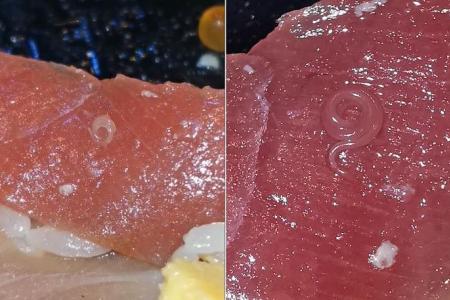In response to queries, a Don Don Donki spokesman said it is in touch with Ms Tan, adding that it is not uncommon to find parasites in wild-caught fresh fish and seafood.
She added: “At Don Don Donki, proper cold-chain management is maintained and visual checks are conducted throughout the handling process – from product sourcing and receiving, to storage preparation and display.
“While we have made our best attempts to remove (parasites), we may not be able to remove them entirely if they are deeply embedded in the flesh.”
The spokesman said advisories are placed near product displays to inform customers that “Anisakis might be present in wild-caught (seafood) such as mackerel, sardine and squid”.
Customers who find parasites in their seafood products should alert store staff, the advisory states.
Anisakis is a type of parasitic worm that, if ingested, can cause an infection with symptoms such as abdominal pain, nausea, vomiting and diarrhoea.
In a similar incident in March 2020, a man found a worm in his mackerel sashimi from a Don Don Donki branch in Jem in Jurong East.
He caught a glimpse of something moving near the fish skeleton and found the worm after zooming in on the food with his phone camera. An employee of the store later apologised and provided a refund.
A Don Don Donki spokesman said then that sashimi slices from the mackerel had been soaked in iced salt water to remove parasites but, in this case, the parasite could have travelled deep into the bones of the fish.
The spokesman added that the company had taken additional preventive measures such as soaking the whole fish in iced salt water to remove parasites that might be in the bones, and refraining from selling sashimi with bones or other fish parts.
Responding to queries, the Singapore Food Agency (SFA) said ready-to-eat raw fish is considered a high-risk food as it does not go through a cooking process.
“Besides microbiological contamination, the consumption of such raw fish also carries a risk of contracting parasitic diseases,” the agency said.
Consistent with international standards, food that is more susceptible to food-borne diseases, including raw fish, is tested for a wide range of hazards including microbial pathogens and presence of parasites, SFA said.
It added: “As a general precaution, vulnerable people with lower immunity system such as pregnant women, children and the elderly, or people with chronic diseases such as diabetes, should not consume raw fish.”

